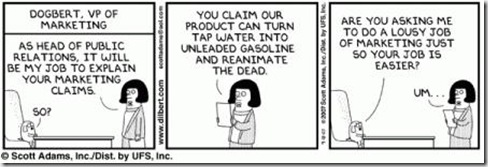There is a story about the Tower of Babel in which a great tower was built in the city of Babylon thousands of years ago.
Babylon was a cosmopolitan city, many of the citizens were very impressed with themselves. They were very important. They did important things. What they did, what they said eclipsed the value of everything and everybody else.
Across this city/state there were a myriad of languages spoken, roll all of this together and it was a very confusing and problematic place to be at the time.
All of this self impression along with the conflicting languages caused things to go badly.
Hmmm. Does any of this strike a cord? Did you notice in my blog posting I deliberately mis-spelled Babel? It’s typed as ‘Babble’. Dictionary.com defines Babble as “to talk idly, irrationally, excessively, or foolishly; chatter or prattle.”
Sound vaguely familiar yet? No? Ok, I’ll keep going.
How about this. Earned Media. Getting warmer? Tagging? Uh-huh. Uniques? Yep. Web 2.0? Sure. Tweets. Of course. What about this one: Link Juice. Ummmm.
Marketers have their own language that to others sounds like well, babble. Try an experiment. Set a meeting request to your company’s CFO and put in the subject line ‘Briefing on Earned Media, Tagging and Link Juice.
See if he or she accepts or instead, declines and emails you back asking what the @#!&# it is you want to waste their time with.
Respond saying you made a mistake. You want to share a few cost-deflection and lost revenue earn-back strategies you’d come across. You’ll probably get a different result. You see, marketers speak ‘promotion’, while CFO’s speak P&L (profit and loss). Accountants speak GAAP (Generally Accepted Accounting Principals), VP’s of Manufacturing speak Lean or Cellular (as in Lean or Cellular Manufacturing). A few mutants still speak Six Sigma. Together at some level in the organization, the management committee made up of the C-level and EVP level peeps who make decisions like merge, divest, close the Scranton Office, etc. speak Revenue Center and Cost Center.
Revenue and Cost center is an interesting language, it has two intertwined dialects. The first, ‘Cost’ is brutal and gutteral, sort of like Gaelic. ‘Revenue’, on the other hand is more melodious and sweet; a joy to listen to.
Those who speak Revenue and Cost see things as, well…generating either revenue or incurring cost. Revenue and Cost speaks only of black and whites. You as a marketer are part of that world. Yes! It’s true. Unfortunately, you reside more often than not in the Cost side; not always a comfortable place. Sales sits in the Revenue side, which can be much more fun. The reason is metrics. Sales can show direct contribution to revenue. TV ads and guerilla marketing tactics usually don’t. Sales are easy to defend. Without hard metrics, marketing is well, squishy and couple squishy metrics with terms and definitions that others don’t get and you are on thin ice in terms of value and influence.
While the term Earned Media sounds cool and is important to help describe all of which help define the granular inner-workings of some marketing tactic, its impact or outcome, most people outside of the marketing department don’t care or even understand. Your marketing power points cause some in the organization to spontaneously bleed from the ears (note: this will usually cause them to exclude you from critical meetings like budget planning).
Not being understood is bad. If they don’t understand, you’re value to the organization is diminished (imagine getting a new boss who doesn’t understand what you do. How long will you last?).

If those who speak Revenue and Cost can’t understand your department or your program’s value, you don’t get the opportunity to actively shape how the marketing promise is delivered.
Those who control the business enterprise (the making of the widget, the pricing of the widget and the distribution of said widget make their decisions regarding the widget without you. Your input falls on deaf ears. Yikes! Hell on earth!
So what to do? Don’t live in the chaos of Babylon waiting for the impending doom. Be proactive! Learn a second language and communicate. When we as marketers are as versatile in the other operational languages our peers speak as we are in our own language, amazing things will happen. One: You will start measuring your activity and results in ways that are important to others (those who speak Revenue and Cost). Two: Your influence and work will amplify in terms of results. Marketing initiatives will begin to be baked into operational activities and visa versa.
What were previously siloed activities will begin to work more harmoniously (i.e. CRM and Social Marketing) and you as a marketer will cease to be viewed by the other non-marketers in the company (whom by the way out number you) as not just the creator of hokey messaging and some un-measurable brand promise but instead the gate keeper of customer loyalty, net profit generation, low-cost win-backs and heck, maybe even a cost deflection source!
Well, we are at the end of this blog posting and the four non-marketers who were reading this have already gotten their fill and left, so I will reveal the big important ah-ha. One that trumps even decoding Revenue and Cost.
You as marketers will hold the power of the customer in your hands and strong customer demand trumps everything. You will understand them better than anyone, you will know how to reach and keep them happy. You will know how to convert more customers using targeted, efficient techniques and tools. You will balance the promise of your marketing efforts with the delivery of those promises by the operation. You will be the master of customer engagement efficiency! You will drive profit, which you can measure and defend…and that is a very good place to be.
That is, if you like that kind of stuff.

